108 books about Boundaries and 6
start with M
108 books about Boundaries and 6
108 books about Boundaries
6 start with M start with M
6 start with M start with M

The Manchurian Frontier in Ch'Ing History
Robert H. G. Lee
Harvard University Press, 1970
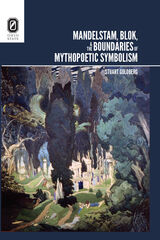
Mandelstam, Blok, and the Boundaries of Mythopoetic Symbolism
Stuart Goldberg
The Ohio State University Press
“Mandelstam had no teacher,” marveled Anna Akhmatova, reflecting on his early maturity and singularity. But Mandelstam himself spoke of the need and even duty to study a poet’s literary roots. So how did this consummately complex, compelling, multi-resonant poet navigate and exploit the burden of the Russian Symbolist movement from which he emerged? How did this process change and augment his poetry?
Through a series of illuminating readings, Stuart Goldberg explores the ongoing role that the poetry of Russian Symbolism played in Osip Mandelstam’s creative life, laying bare the poet’s productive play with distance and immediacy in his assimilation of the Symbolist heritage. At the same time, Mandelstam, Blok, and the Boundaries of Mythopoetic Symbolism presents the first coherent narrative of the poet’s fraught relationship with Alexander Blok, the most powerful poetic voice among the Symbolists. This dialogue, which was largely one-sided, extended beyond poetic intertext into the realms of poetics, charisma, and personality.
Goldberg’s study pushes theoretical boundaries, exploring the juncture between pragmatics and intertext, adapting and challenging Bloom’s anxiety of influence theory, and, ultimately, tracing a shift in the nature of sincerity and authenticity that divided poetic generations.
[more]
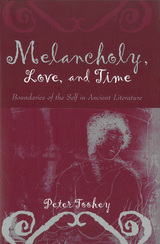
Melancholy, Love, and Time
Boundaries of the Self in Ancient Literature
Peter Toohey
University of Michigan Press, 2004
Ancient literature features many powerful narratives of madness, depression, melancholy, lovesickness, simple boredom, and the effects of such psychological states upon individual sufferers. Peter Toohey turns his attention to representations of these emotional states in the Classical, Hellenistic, and especially the Roman imperial periods in a study that illuminates the cultural and aesthetic significance of this emotionally charged literature. His probing analysis shows that a shifting representation of these afflicted states, and the concomitant sense of isolation from one's social affinities and surroundings, manifests a developing sense of the self and self-consciousness in the ancient world.
This book makes important contributions to a variety of disciplines including classical studies, comparative literature, literary and art history, history of medicine, history of emotions, psychiatry, and psychology.
Peter Toohey is Professor and Department Head of Greek and Roman Studies at the University of Calgary, Canada.
[more]
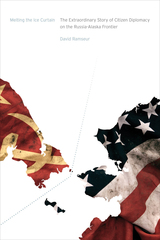
Melting the Ice Curtain
The Extraordinary Story of Citizen Diplomacy on the Russia-Alaska Frontier
David Ramseur
University of Alaska Press, 2017
Just five years after a Soviet missile blew a civilian airliner out of the sky over the North Pacific, an Alaska Airlines jet braved Cold War tensions to fly into tomorrow. Crossing the Bering Strait between Alaska and the Russian Far East, the 1988 Friendship Flight reunited Native peoples of common languages and cultures for the first time in four decades. It and other dramatic efforts to thaw what was known as the Ice Curtain launched a thirty-year era of perilous, yet prolific, progress.
Melting the Ice Curtain tells the story of how inspiration, courage, and persistence by citizen-diplomats bridged a widening gap in superpower relations. David Ramseur was a first-hand witness to the danger and political intrigue, having flown on that first Friendship Flight, and having spent thirty years behind the scenes with some of Alaska’s highest officials. As Alaska celebrates the 150th anniversary of its purchase, and as diplomatic ties with Russia become perilous, Melting the Ice Curtain shows that history might hold the best lessons for restoring diplomacy between nuclear neighbors.
Melting the Ice Curtain tells the story of how inspiration, courage, and persistence by citizen-diplomats bridged a widening gap in superpower relations. David Ramseur was a first-hand witness to the danger and political intrigue, having flown on that first Friendship Flight, and having spent thirty years behind the scenes with some of Alaska’s highest officials. As Alaska celebrates the 150th anniversary of its purchase, and as diplomatic ties with Russia become perilous, Melting the Ice Curtain shows that history might hold the best lessons for restoring diplomacy between nuclear neighbors.
[more]
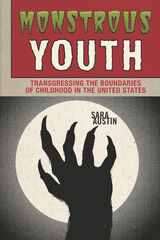
Monstrous Youth
Transgressing the Boundaries of Childhood in the United States
Sara Austin
The Ohio State University Press, 2022
The monstrous has a long, complicated history within children’s popular media. In Monstrous Youth: Transgressing the Boundaries of Childhood in the United States, Sara Austin traces the evolution of monstrosity as it relates to youth culture from the 1950s to the present day to spotlight the symbiotic relationship between monstrosity and the bodies and identities of children and adolescents. Examining comics, films, picture books, novels, television, toys and other material culture—including Monsters, Inc. and works by Mercer Mayer, Maurice Sendak, R. L. Stine, and Stephanie Meyer—Austin tracks how the metaphor of monstrosity excludes, engulfs, and narrates difference within children’s culture.
Analyzing how cultural shifts have drastically changed our perceptions of both what it means to be a monster and what it means to be a child, Austin charts how the portrayal and consumption of monsters corresponds to changes in identity categories such as race, sexuality, gender, disability, and class. In demonstrating how monstrosity is leveraged in service of political and cultural movements, such as integration, abstinence-only education, and queer rights, Austin offers insight into how monster texts continue to reflect, interpret, and shape the social discourses of identity within children’s culture.
Analyzing how cultural shifts have drastically changed our perceptions of both what it means to be a monster and what it means to be a child, Austin charts how the portrayal and consumption of monsters corresponds to changes in identity categories such as race, sexuality, gender, disability, and class. In demonstrating how monstrosity is leveraged in service of political and cultural movements, such as integration, abstinence-only education, and queer rights, Austin offers insight into how monster texts continue to reflect, interpret, and shape the social discourses of identity within children’s culture.
[more]
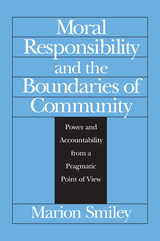
Moral Responsibility and the Boundaries of Community
Power and Accountability from a Pragmatic Point of View
Marion Smiley
University of Chicago Press, 1992
The question of responsibility plays a critical role not only in our attempts to resolve social and political problems, but in our very conceptions of what those problems are. Who, for example, is to blame for apartheid in South Africa? Is the South African government responsible? What about multinational corporations that do business there? Will uncovering the "true facts of the matter" lead us to the right answer?
In an argument both compelling and provocative, Marion Smiley demonstrates how attributions of blame—far from being based on an objective process of factual discovery—are instead judgments that we ourselves make on the basis of our own political and social points of view. She argues that our conception of responsibility is a singularly modern one that locates the source of blameworthiness in an individual's free will. After exploring the flaws inherent in this conception, she shows how our judgments of blame evolve out of our configuration of social roles, our conception of communal boundaries, and the distribution of power upon which both are based.
The great strength of Smiley's study lies in the way in which it brings together both rigorous philosophical analysis and an appreciation of the dynamics of social and political practice. By developing a pragmatic conception of moral responsibility, this work illustrates both how moral philosophy can enhance our understanding of social and political practices and why reflection on these practices is necessary to the reconstruction of our moral concepts.
In an argument both compelling and provocative, Marion Smiley demonstrates how attributions of blame—far from being based on an objective process of factual discovery—are instead judgments that we ourselves make on the basis of our own political and social points of view. She argues that our conception of responsibility is a singularly modern one that locates the source of blameworthiness in an individual's free will. After exploring the flaws inherent in this conception, she shows how our judgments of blame evolve out of our configuration of social roles, our conception of communal boundaries, and the distribution of power upon which both are based.
The great strength of Smiley's study lies in the way in which it brings together both rigorous philosophical analysis and an appreciation of the dynamics of social and political practice. By developing a pragmatic conception of moral responsibility, this work illustrates both how moral philosophy can enhance our understanding of social and political practices and why reflection on these practices is necessary to the reconstruction of our moral concepts.
[more]
READERS
Browse our collection.
PUBLISHERS
See BiblioVault's publisher services.
STUDENT SERVICES
Files for college accessibility offices.
UChicago Accessibility Resources
home | accessibility | search | about | contact us
BiblioVault ® 2001 - 2024
The University of Chicago Press









